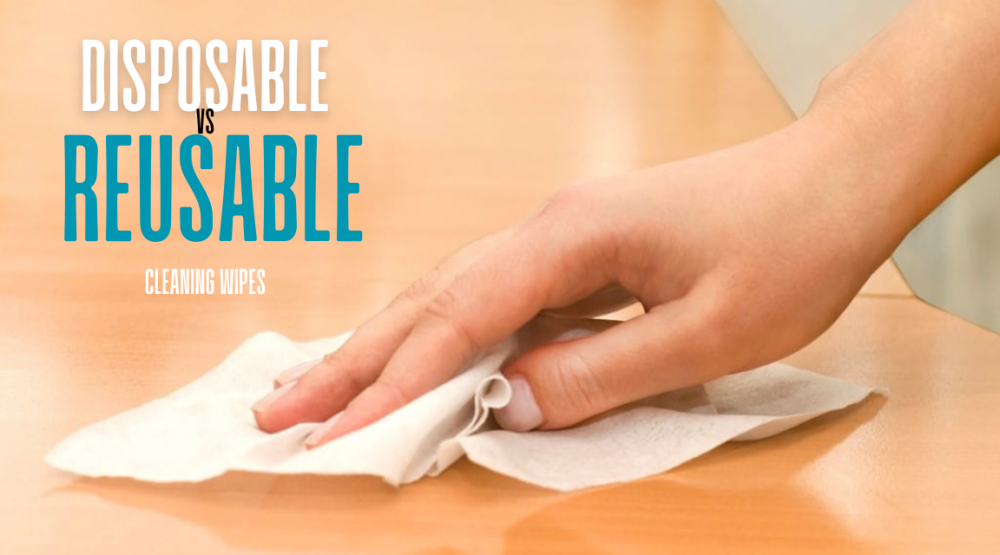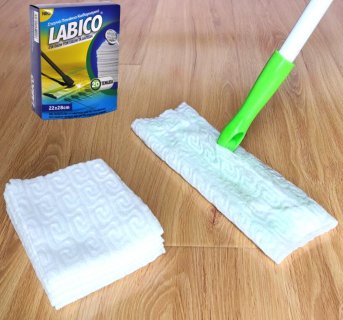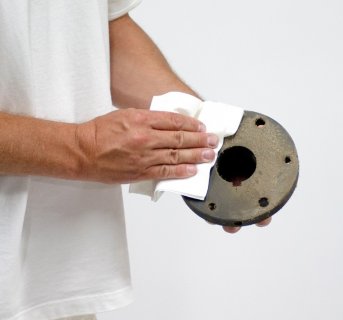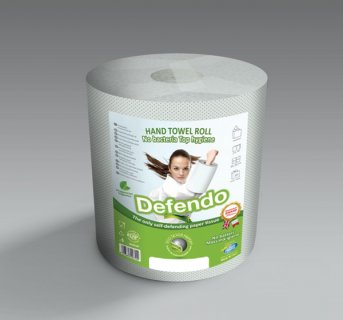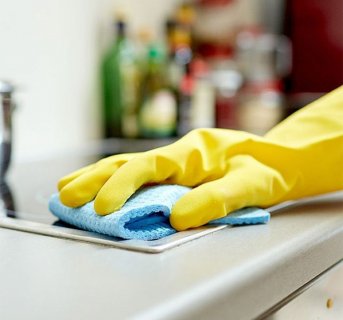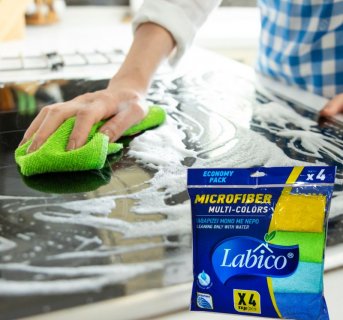One of the most common cleaning items, at home or in professional settings, is the cleaning wipe. Wipes are also the subject of one of the most common debates within the cleaning industry, disposable vs reusable.
Where are Wipes found?
Globally, the market for cleaning wipes splits down into four sections.
- Personal care - these wipes cover personal care, this can include everything from baby wipes to cosmetic wipes to personal hygiene.
- Household wipes - these are cleaning wipes, often including disinfectant properties that are applicable to multiple surfaces and textiles around the home.
- Industrial wipes - as a counterpart to household wipes, industrial wipes are used for surfaces, but also more contaminant specific wipes such as those applicable for automotive soils, or use on electrical equipment.
- Medical wipes - encompassing use with both people and surfaces, healthcare wipes can be antibacterial and also focused on preventing the spread of infection.
Using Disposable Wipes
Disposable wipes, or single use wipes as they are sometimes also referred to, can be used once and then disposed of alongside any other detritus from the cleaning process. As such there are a variety of advantages and disadvantages to using these wipes.
The Benefits of Disposable Wipes
By far and away the biggest pro for users is the convenience of disposable wipes. Whatever the application, the ability to clean and then dispose of the wipe and dirt together once cleaning is completed creates efficiency.
There’s no need to clean the wipe or employ a separate disposal method for dirt.
Disposable wipes offer additional efficiency in their formulation. They come pre-moistened and loaded with applicable cleaning materials, appropriate for their target function, whether that’s for personal cleanliness, or textiles and surfaces.
For this reason, disposable wipes are also very portable, not requiring you to cart around water and cleaning solutions, simply open the packet and the next wipe is ready to go.
But are the ease and efficiency of disposable wipes entirely beneficial?
The Drawbacks of Disposable Wipes
The environmental impact of disposable wipes, especially in industrial or commercial settings, can be a significant contributor to waste and wipes contaminated with biological or synthetic soilage can be hard, if not impossible, to feed through a recycling process.
While the fiber or material that makes up a disposable wipe can be biodegradable, to minimise environmental impact, the chemical soils that may be on them contribute to ecological contamination and may act as catalysts in the creation of leachate within landfills.
And it isn’t just the environmental cost, there can be an economic cost associated with disposable wipes. The comparative number of cleans you may get from a durable reusable wipe can provide significant commercial and sustainable advantages.
Ultimately, the use of disposable wipes will depend on the situation you are in. Sometimes a need to clean and dispose of soils and contaminants in a single action can provide better outcomes than the associated process with a reusable wipe.
The Pros and Cons of Reusable Wipes
Reusable wipes are more durable, both in construction and in terms of process use than disposable wipes.
Compared with disposable wipes, reusable products tend to have far higher sustainability credentials. A microfiber product that can perform hundreds of cleans has a fraction of the production costs as the multiple packets of disposable wipes needed for the same volume of cleaning. The durability of reusable products also means one reusable product can be used for multiple different cleaning processes, where disposable wipes are much more use-case specific.
Overall this means significantly less waste to the landfill and when constructed from biodegradable, responsible microfibre materials, ecological impact is minimised further.
Reusable wipes themselves are also a more cost efficient option for reasons of durability. Buying one product to replace many creates cost savings compared with more frequent repurchases.
You can also have more adaptive and dynamic cleaning processes with a reusable product. It can be used in different areas, for different purposes, with different cleaning solutions. Reusable cleaning wipes can replace not just multiple purchases of a single-use product that has one cleaning function, but potentially several different single-use products, which all have different uses.
While these are all positive advantages over disposable wipes, it does bring with them questions about what secondary issues there might be with reusables?
In use, reusable wipes need to be reapplied with cleaning solutions for the task at hand. These solutions require additional purchases that can eat away at some of the cost savings disposable wipes offer. There’s also a need to clean reusable wipes between uses needing more cleaning agents and increasing the amount of water that is part of the products life cycle as well as energy costs.
Commercial Considerations for Cleaning Wipes
Across the cleaning industry in 2023, we’re going to see two of the big trends being sustainability and the need to combat increasing costs.
Commercial entities, as well as cleaning specific businesses, will be looking to clean in a more considerate way that protects the ecology of today and the resources of tomorrow with the products they create and use.
Baseline costs for commercial operation, such as energy and materials, have faced tremendous disruption as a result of geo-political disruptions in previous years. As a result, businesses will look to save costs wherever they can, particularly in fundamental areas such as cleaning.
Ultimately, the type of wipe that is used in cleaning processes needs to acknowledge the practical needs of what is being cleaned with them, in what circumstances, as well as the commercial and sustainability aims of those buying and using them.

